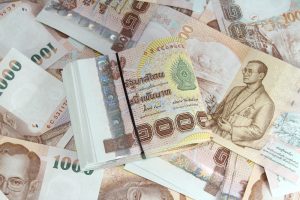Yesterday, Reuters published a report based on a draft of a policy speech that Thailand’s new Prime Minister Srettha Thavisin is due to give next week, outlining some of the main elements of the economic policy that the incoming government is set to pursue.
As expected, the policy is heavy on populist measures. According to Reuters, Srettha’s administration plans to “give each citizen a 10,000 baht ($282) handout, delay debt repayments, and lower energy prices in a bid to ease the cost of living and boost the economy.”
“The policy will trigger economic growth … we will inject the economy with cash so that it reaches everyone and creates opportunities for all,” states the draft speech, which Srettha, who was sworn in earlier this week, is due to deliver in Parliament on Monday.
In the policy speech draft cited by Reuters, the government said it would help farmers and small businesses affected by the COVID-19 pandemic by offering them moratoriums on debt repayments, which it said would “be fiscally responsible and not create moral hazard.” The government also plans to lower the prices of electricity and cooking oil, and, as has previously been reported, to boost the number of tourism arrivals by relaxing visa requirements from China, India, and other important tourist markets.
The heavy emphasis on populist economic measures is not surprising given the origins of Srettha’s Pheu Thai Party. This was among the main reasons for the rampant popularity of the party’s spiritual leader, former Prime Minister Thaksin Shinawatra, who won landslide election victories in 2001 and 2005 by promising (and then delivering) universal health care and other big-ticket government services. It is also largely the reason why, despite Thaksin’s overthrow in a coup in 2006, Pheu Thai and its predecessor parties continued to win elections – to the chagrin of the conservative elites whose predominance Thaksin’s popularity threatened.
The populist focus of Srettha’s administration will also be important in placating party supporters critical of the party’s controversial decision to join hands with conservative political parties – the very same forces that once fought fiercely to extricate Thaksin and the parties aligned with him from the political landscape.
Parliament selected Srettha as prime minister after a protracted period of political negotiation and horse-trading following the general election on May 14, at which Pheu Thai finished only in second place. The winner was the progressive Move Forward Party (MFP), which had energized its youthful support base on a progressive platform.
However, due to the staunch opposition of the military-appointed Senate, the party was unable to win a parliamentary vote to confirm its leader Pita Limjaroenrat as prime minister.
The Pheu Thai Party then formed a broader coalition but was forced to drop MFP in order to win the Senate’s support. The 11-party coalition that it created included two pro-military parties, despite the party’s campaign pledge not to work with the forces associated with the coup that overthrew a Pheu Thai government in 2014.
The decision prompted considerable anger among the “red shirts” who had acted as Thaksin’s foot soldiers during the years of stand-offs with the conservative establishment, and many observers believe that by sacrificing its pro-democracy credentials on the altar of political pragmatism, it has paved the way for long-term decline. One way that Pheu Thai might avoid this fate is to deliver quick and concrete improvements in people’s economic situation.
The challenge for Srettha is that he is inheriting an economy that is facing a number of tricky headwinds. Growth in the second quarter came in at 1.8 percent, well short of the median forecast of 3.1 percent projected by a Reuters poll of economists.
The economy has been hamstrung by weak exports and slower-than-expected recovery in the important tourism sector, as well as “falling investor confidence due to a protracted period without a government following elections in May.” Last month, the state planning agency cut its 2023 GDP growth outlook to 2.5-3.0 percent from 2.7-3.7 percent.

































